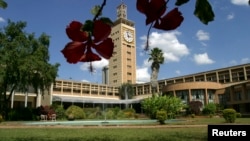A Kenya High Court plans to hear complaints Friday filed by the Law Society of Kenya (LSK) as well as other civil rights groups seeking to prevent lawmakers from receiving their recently approved salary increases.
Apollo Mboya, the chief executive officer of the Kenya Law Society, says his group is challenging the action of the parliamentarians following a public backlash after lawmakers unanimously voted to increase their salaries, 130 times the legal minimum wage.
He says the LSK filed the complaints late Thursday, raising constitutional concerns about the ability of Members of Parliament (MPs) to increase their own pay.
“What we have put in the petition seeks to declare that the Salaries and Remuneration Commission is the constitutionally mandated institution that can set salaries for public officers and state officers in Kenya, and that nobody should enforce the salary demands that the MPs have awarded themselves, irregularly and against the constitution,” said Mboya.
Mboya’s comments came after a court ruling on Thursday blocked the Parliamentary Service Commission from releasing funds to pay for the lawmakers increased pay, at least until its Friday hearing.
He says the LSK wants the court to stop the parliament and its speaker, the Salaries and Remuneration Commission as well as the Controller of Budget, and the attorney general from enforcing the decision by lawmakers to increase their pay.
Mboya says the Law Society is mandated to protect the interest of the public on legal matters. He says his group petitioned the High Court after the public registered displeasure over the salary increases.
“Under that mandate, we decided in public interest to institute this petition after the MPs and supported by a motion in parliament to annul the gazette notices that had been issued by the Salaries and Remuneration Commission with respect to their salaries,” said Mboya.
But, lawmaker James Opiyo Wandayi says parliament needs to educate the public about the controversy surrounding lawmakers’ pay.
“The Parliamentary Service Commission, which is in charge of the welfare of members of parliament and other staff of parliament, needs to make a clarification or to do a sensitization [campaign] so the public may come to understand the issues as they are,” continued Wandayi, “because what is not being told is that [legislators] this time around, unlike in the past, are obligated to pay taxes just like any other members of the public.”
Mboya disagreed with the stance of the parliamentarians.
“That is a very strange argument because everybody is supposed to pay tax anyway, even if you earn 10,000 KES [$118] you are supposed to pay tax. These are people who are earning over 500,000 KES [$5,891] salaries, and if you add other allowances, they are actually taking home with them with over 1,000,000.00 KES [$ 11,781], yet they want to increase their basic salary,” said Mboya.
Apollo Mboya, the chief executive officer of the Kenya Law Society, says his group is challenging the action of the parliamentarians following a public backlash after lawmakers unanimously voted to increase their salaries, 130 times the legal minimum wage.
He says the LSK filed the complaints late Thursday, raising constitutional concerns about the ability of Members of Parliament (MPs) to increase their own pay.
“What we have put in the petition seeks to declare that the Salaries and Remuneration Commission is the constitutionally mandated institution that can set salaries for public officers and state officers in Kenya, and that nobody should enforce the salary demands that the MPs have awarded themselves, irregularly and against the constitution,” said Mboya.
Mboya’s comments came after a court ruling on Thursday blocked the Parliamentary Service Commission from releasing funds to pay for the lawmakers increased pay, at least until its Friday hearing.
He says the LSK wants the court to stop the parliament and its speaker, the Salaries and Remuneration Commission as well as the Controller of Budget, and the attorney general from enforcing the decision by lawmakers to increase their pay.
Mboya says the Law Society is mandated to protect the interest of the public on legal matters. He says his group petitioned the High Court after the public registered displeasure over the salary increases.
“Under that mandate, we decided in public interest to institute this petition after the MPs and supported by a motion in parliament to annul the gazette notices that had been issued by the Salaries and Remuneration Commission with respect to their salaries,” said Mboya.
But, lawmaker James Opiyo Wandayi says parliament needs to educate the public about the controversy surrounding lawmakers’ pay.
“The Parliamentary Service Commission, which is in charge of the welfare of members of parliament and other staff of parliament, needs to make a clarification or to do a sensitization [campaign] so the public may come to understand the issues as they are,” continued Wandayi, “because what is not being told is that [legislators] this time around, unlike in the past, are obligated to pay taxes just like any other members of the public.”
Mboya disagreed with the stance of the parliamentarians.
“That is a very strange argument because everybody is supposed to pay tax anyway, even if you earn 10,000 KES [$118] you are supposed to pay tax. These are people who are earning over 500,000 KES [$5,891] salaries, and if you add other allowances, they are actually taking home with them with over 1,000,000.00 KES [$ 11,781], yet they want to increase their basic salary,” said Mboya.










